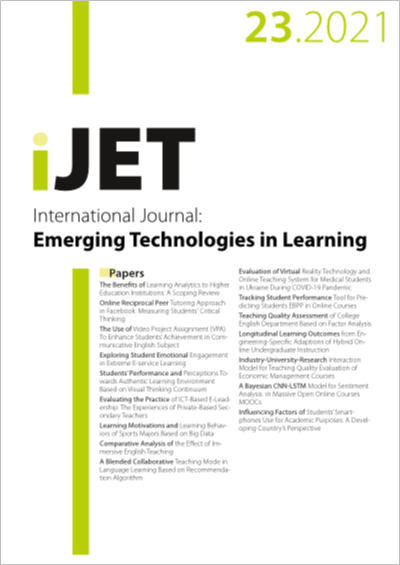Covid-19: Why Virtual Learning Becomes A Pedagogical Acceptance Model in Africa
DOI:
https://doi.org/10.3991/ijet.v17i01.23567Keywords:
Coronavirus, Technology Acceptance Model, E-Learning, Teaching and LearningAbstract
The outbreak of coronavirus pandemic has led to different regulations and changed the usual way of doing things. Considering the level of technology in Africa society before the outbreak of the epidemic many activities, including classroom teaching and learning were affected. This paper examines virtual learn-ing as an unavoidable pedagogical model for learning during the COVID-19 pandemic. A cross-sectional study was conducted by adopting the Technology Acceptance Model. Data were obtained from an online survey of 543 respondents and analyzed. Regression of Partial Least Squares (PLS) was used for modeling and hypothesis testing. The results revealed that perceived usefulness, perceived ease of use, regulatory compliance, and implementation context significantly affect educators' and learners' attitudes towards adopting virtual learning for learning. Subsequently, regulatory compliance had the most substantial influence on educators' and learners' attitudes towards adopting virtual learning for learning during the COVID-19 outbreak. This study established that the adoption of virtual learning has enhanced learning during the coronavirus pandemic lock-down, and the process would also continue after the pandemic. Virtual learning has provided the classroom experience for learners and educators.
Downloads
Published
2022-01-20
How to Cite
James, N., Vincent, O. R., Akande, N. O., & Makinde, A. S. (2022). Covid-19: Why Virtual Learning Becomes A Pedagogical Acceptance Model in Africa. International Journal of Emerging Technologies in Learning (iJET), 17(01), pp. 206–223. https://doi.org/10.3991/ijet.v17i01.23567
Issue
Section
Papers
License
Copyright (c) 2021 Nubi James, Olufunke Rebecca Vincent, OLUWATOBI NOAH AKANDE, Ayodeji Samuel Makinde

This work is licensed under a Creative Commons Attribution 4.0 International License.



